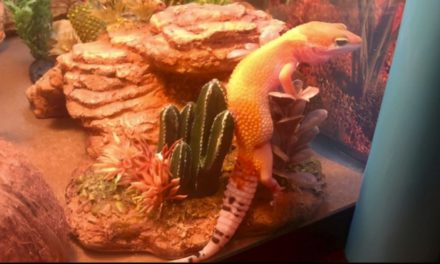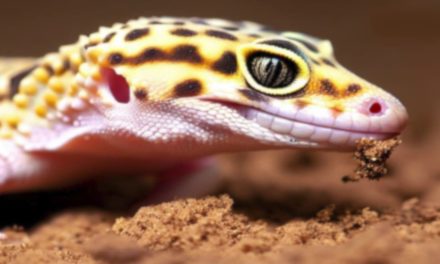
When it comes to our scaly friends, the leopard gecko, understanding and managing health issues such as parasites is crucial. Not only does it ensure the well-being of our adorable reptiles, but also gives us owners peace of mind.
Let’s dive into the (slightly ‘icky’) world of leopard gecko parasites. We’ll cover symptoms to solutions, and ensuring your pet thrives in a healthy, happy environment.
Decoding the Dilemma of Leopard Gecko Parasites
Imagine your gecko as a tiny, four-legged superhero, and parasites as the sneaky villains. These uninvited guests, ranging from mites and worms to the notorious Cryptosporidium, can cause a range of symptoms. Spotting these signs early can be the key to your gecko’s speedy recovery.
Let’s break down these symptoms and understand what exactly we’re up against.
Common Culprits and Their Telltale Signs
Parasites in leopard geckos can be as stealthy as a cat burglar, but certain signs can blow their cover. Weight loss, a condition known as “stick tail” (where their tail gets very thin) and a general ‘being tired all the time’ are big red flags.
These signs are like your gecko is saying, “Hey, something’s not right here!” So recognizing these symptoms early can lead to quicker, more effective treatment.
Detailed Look at Specific Parasites
Leopard geckos can fall prey to a variety of parasites, each with its unique challenges. Understanding these parasites, their impact, and treatment options is crucial for every responsible gecko owner.
Let’s delve into some of the most common parasites affecting these little warriors.
- Coccidia: These are tiny, single-celled parasites that invade and infect the digestive tract. Infected geckos might suffer from diarrhea, dehydration, and weight loss. Treatment typically involves medications like sulfadimethoxine or trimethoprim-sulfamethoxazole, alongside ensuring a clean, stress-free environment for recovery.
- Pinworms: Common yet generally less harmful, pinworms reside in the gecko’s lower intestine. Symptoms include weight loss and a lackluster appearance, but many geckos show no obvious signs. Treatment usually involves a dewormer like fenbendazole, administered under veterinary guidance.
- Cryptosporidium: This is a particularly nasty parasite, notorious for causing severe weight loss and a condition known as ‘stick tail’. It’s a challenging parasite to treat, often requiring a combination of supportive care, anti-parasitic medications, and sometimes, more aggressive treatments like paromomycin. Maintaining excellent hygiene and minimizing stress are key components of managing this condition.
- Mites: External parasites that can be seen crawling on the skin or in the gecko’s enclosure. They cause skin irritation, stress, and can lead to secondary infections. Treatment involves topical miticides, thorough cleaning of the enclosure, and sometimes, environmental insecticides.
- Roundworms: These parasites can lead to gastrointestinal blockage, malnutrition, and lethargy. Treatment typically involves anti-parasitic medications, and like with other parasites, maintaining a clean habitat is crucial for prevention and recovery.
- Hookworms: Similar to roundworms, hookworms attach to the intestinal wall, leading to blood loss, anemia, and weakness. Treatment involves specific anti-parasitic drugs and should be overseen by a vet to ensure the safety and recovery of the gecko.
- Giardia: Another single-celled parasite, Giardia affects the intestine, causing diarrhea, weight loss, and dehydration. Treatment often involves metronidazole or fenbendazole, alongside supportive care like fluid therapy and dietary management.
Each of these parasites requires a tailored approach to treatment and management. It’s vital to work closely with a vet experienced in reptile care to diagnose these conditions accurately and prescribe the most effective treatment
Remember that prevention is always better than cure. So maintaining a clean habitat, practicing good hygiene, and regular health check-ups are your best defense against these pesky invaders.
Diagnosis and Treatment: Your Gecko’s Game Plan
When it comes to fighting these pesky parasites, knowledge is your sword and shield. It’s not just about healing; it’s about giving your gecko a fighting chance for a healthy life.
Let’s talk about the strategies and treatments that can turn the tide in this battle.
From Detection to Recovery
Diagnosing leopard gecko parasites often involves a visit to the vet, who might recommend fecal exams or blood tests. Treatment varies based on the parasite, but it generally includes medication and changes in habitat cleanliness. Remember, it’s not just about curing; it’s about caring.
One case study I read recently showed a leopard gecko happily bouncing back from Cryptosporidiosis. All it took was the right treatment and a dollop of love and care. 🙂
Emphasizing Early Detection and Treatment
Catching these parasitic critters early is so important. Early treatment can prevent more severe health issues and even save your geckos life. It’s like catching a small leak before it becomes a flood.
Regular check-ups and being attentive to even the slightest changes in your gecko’s behavior or appearance can make all the difference. Don’t be overly worried and get crazy about it though – just keep an eye on them!
Preventative Measures
Keeping your gecko’s habitat clean, ensuring regular vet check-ups, and following quarantine procedures for new or sick geckos can keep these parasitic pirates at bay.
Creating a Fortress of Health
Maintaining a clean habitat isn’t just about how it looks – it’s about creating a fortress against health threats. Regular cleaning, proper sanitation, and monitoring your gecko’s environment are like the high walls and deep moats protecting a castle.
It’s about making your gecko’s home a stronghold of health and happiness.
Step-by-Step Habitat Cleanliness
Cleaning your gecko’s habitat involves more than just a quick sweep. Think of it as a strategic mission, involving thorough cleaning of the enclosure, disinfecting water and food dishes daily, and replacing substrate regularly.
Always quarantine new or sick geckos to prevent the spread of parasites. Keep them completely separate from other geckos until you know it’s safe. Do not share anything between them without cleaning it first.
Nutritional Support and Environmental Control: The Dynamic Duo
Your gecko’s health depends on two critical components: nutrition and environment (where they live).
So ensuring your gecko gets the right nutrients and lives in a habitat with proper UVB lighting, as well as correct temperature and humidity is like giving them a superhero’s cape. Let’s explore how these elements work together to keep your gecko leaping tall terrariums in a single bound. 🙂
The Power of Proper Diet and Habitat
A balanced diet and a well-maintained habitat can work wonders. A fellow gecko enthusiast I spoke to recently revealed how just a simple change in diet and habitat greatly improved their gecko’s health. It’s just like turning the dial up on your gecko’s superpowers!
Long-term Management for Cryptosporidiosis
Dealing with Cryptosporidiosis requires a marathon mindset, not a sprint. This means a long-term good diet, ensuring a clean and stress-free environment. And of course those regular vet check-ups.
It’s all a commitment to your gecko’s lifelong health and happiness.
Ethical Considerations: The Heart of Gecko Care
Caring for a leopard gecko with parasites goes beyond just medical treatment; it’s about making ethical, compassionate decisions. Balancing treatment with quality of life, understanding the costs and commitment, and being a responsible pet owner are the cornerstones of ethical gecko care.
Making Informed, Compassionate Choices
Deciding on treatment options and considering your gecko’s quality of life are like walking a tightrope of responsibility. It’s about weighing the options, understanding the implications, and choosing the path that ensures the best life for your scaly companion. It’s a journey of care, commitment, and compassion.
Sometimes you just have to make sad decisions, but that’s why we take the time to understand leopard gecko parasites and how to prevent them.
Wrapping Up: A Journey of Care and Commitment
Embarking on the journey of understanding and managing gecko parasites is a testament to your dedication as a pet owner. It’s about being proactive and continuously learning.
Remember, a healthy gecko is a happy gecko, and a happy gecko makes for a joyful heart. So, let’s keep our little friends thriving, one day at a time.
Read more about other leopard gecko health problems:-




![Leopard Gecko Metabolic Bone Disease [Gecko Owners Guide]](https://cdn.leopardgeckoland.com/wp-content/uploads/2023/07/gecko-in-bed-with-mbd-440x264.webp)










